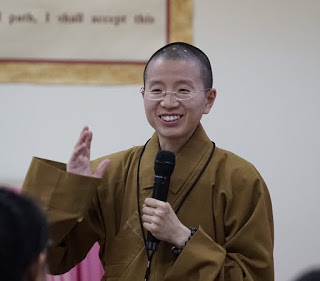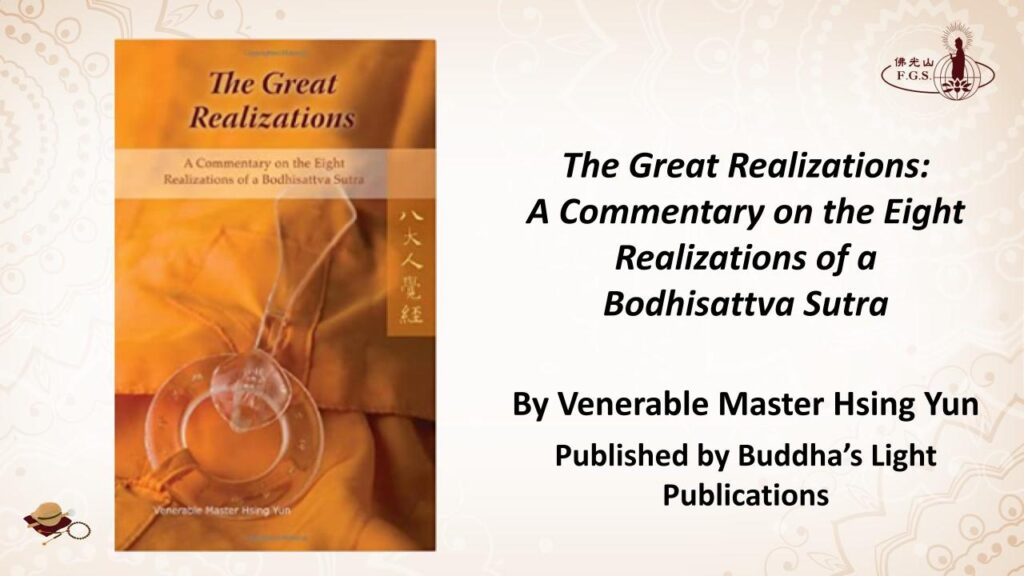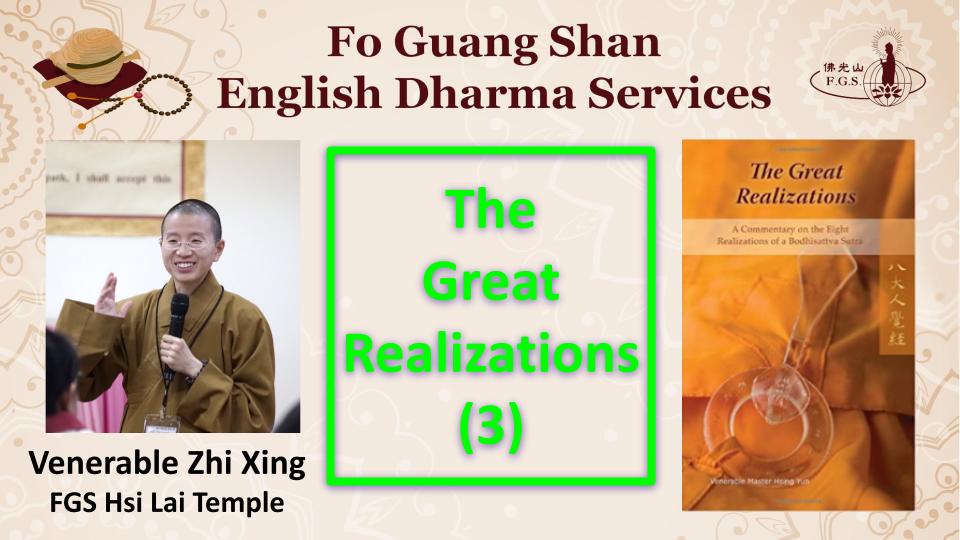
Speaker: Ven. Zhi Xing
Fo Guang Shan Hsi Lai Temple, Los Angeles
I. Introduction
Auspicious greetings to all friends from around the world! My name is Ven. Zhixing. Thank you for joining our online English Dharma service. I will be sharing some of the teachings from the Eight Realizations of a Bodhisattva Sutra.

II. Second Realization
Realize that the mind cannot be satisfied but only seeks more, increasing its wrongdoing and unwholesomeness. A bodhisattva is not like this; he is always satisfied with what he has, is peaceful in poverty, and upholds the Way. Wisdom is his only concern.
III. The Bondage of Desire
An important insight to learn from the third realization is that contentment is the source of happiness. The first question we might have is what does contentment mean? In addition to meaning being satisfied with what you currently have, Venerable Master Hsing Yun said that contentment also means being able to manage and control one’s desire and temptations. We probably heard of people telling us that contentment is the source of happiness before, but didn’t think much about it.
The question we can ask ourselves is what if we are not content? What would happen? The Buddha told us a mind filled with desires will increase our wrongdoing and unwholesomeness, not to mention the fact that we will not be happy. Why would this be? If we think about it, desire is like a wild horse. If we don’t put a rein on the wild horse, it will run all over the place, and cause some destruction. This is the same with our desires. If we don’t keep our desires in check, we will notice that we have become a slave to our own desires. We will work tirelessly for the desires we have. When we obtain what we want, there are more things that we want. We are always busy chasing after these desires, and slowly lose ourselves along the way.
Worst case scenario is when our desires drive us to do things we regret or even commit crimes. In 1992, Irene Seale and her husband who was a former police officer and employee at Exxon Company, kidnapped the president of Exxon Company, Mr. Sidney Reso. The New York Times called it a “twisted tale of a kidnapping and of dreams gone wrong.” They demanded a ransom of $18.5 million from his company and ended up killing Sidney Reso during a struggle. Greed was believed to be the motive of the crime because the Seales couples wanted to live a lavish lifestyle that they could not afford.
Venerable Master Hsing Yun said that there are seven major problems that arise from having strong desires: They may lead us to steal from others. They may lead us to borrow things and not return them. They may lead us to misappropriate wealth that has been entrusted to us. They may lead us to cheat our business partners through false reporting or though sly methods that lead to our having more control than was originally agreed upon. Strong desires may lead us to misuse company funds, materials, or office supplies. They may lead us to commit acts of extortion or blackmail. They may lead us to make money by owning or operating enterprises that encourage gambling, the irresponsible use of alcohol or drugs, prostitution, or the killing of animals. This is why desires will increase our wrongdoing.
Nowadays, we live in a time when we are bombarded by various information from social media. We are easily connected to people who may live on the other side of the globe. Through social media such as Facebook, Snapchat, Ticktok, and so on, we get a glimpse of other people’s seemingly very perfect life. Seeing other’s perfect homes, enjoyment of various delicacies, travels to various exotic places or interesting experiences, may give rise to our desires for them. We might want the same for ourselves. If we don’t have contentment and mindfulness of our desires, we may become negative about our own life. As we are always comparing our own life and experience with one that we don’t have, how can we be happy?
IV. How to Find Contentment in Life?
How then can we find contentment in our life? Being satisfied with our life doesn’t mean we then stop where we are and not continue to improve. It doesn’t mean we don’t need to continue to develop. Another way to phrase our question is, how do we manage our desires? The first thing we should know is that our desires arise because we want to be happy. If we think living in a big house, or making lots of money or buying fancy clothing or traveling make us happy, we will have desires for them.
To manage our desires, we should first understand that there is a difference between happiness and life satisfaction, which is the true happiness in life. According to Daniel Gilbert, professor of Psychology at Harvard University, the meaning of happiness is “anything we pleased” (Gilbert, 2009)[ https://positivepsychology.com/life-satisfaction/]. Happiness is an immediate, in-the-moment experience. We are happy at the moment, but it’s fleeting. We might think that getting the things we want, making lots of money, becoming famous, travelling around and so on are happiness for us. Yes, we would be happy when we do have all these, but it’s only for a short time. Just like we are happy when we are traveling, however, this happiness may end after we come back to face our work and life. If we think that satisfying our desires is true happiness, it will be very hard for us to be happy as our desires are limitless. It’s hard to get all the things we desire. If we can’t get what we want, then we will be angry and upset.
Life satisfaction, on the other hand, is more stable and long-lived than happiness, and it is about being pleased with our life and how it’s going. This includes being pleased with our work, relationships with family and friends, personal development, health, wellness and others. This is why living a life of simplicity can bring us life satisfaction because we learn to enjoy life as it is, not clouded by our desires. We should realize that having more doesn’t mean we will be happier.
V. Being Content with What We Have
Once, there was a wealthy man who owed lots of wealth and treasures, but he was not happy. One day, he had decided to set off on a journey to search for happiness. The wealthy man carried lots of treasures and jewelry with him in his backpack. Every day, he would carry this heavy backpack with him. As days went by, he became more and more frustrated and couldn’t find any happiness at all. He was tired and didn’t get to enjoy the beautiful scenes that he passed by.
One day, the wealthy man saw a farmer singing while walking toward him. The wealthy man asked the farmer, “You look very happy. Are you happy?” The farmer said, “Yes! I am very happy. The rice I planted are taller, and I found some tree branches for fire and some mushrooms along this road.” The wealthy man then said, “I have everything as you can see from all these treasures I have in my backpack. However, I am not happy. Can you tell me the secret to happiness?”
The farmer shyly smiled and replied, “there is no secret. It’s very simple to be happy. You just need to let go of the burden on your back.”
The wealthy man suddenly had a realization upon hearing the farmer’s words, “that’s right! The heavy treasures are making my back hurt. Every day and night, I am worried that someone would steal them. It’s inconvenient to carry them around, but I can’t let go of them. In this way, how can I be happy? If I only bring enough money, then I can simply enjoy the beautiful sceneries. Maybe if I shared these treasures with the poor people, others would be happy and I may become happy too!”
The wealthy man gave his treasures to all those who were in need, and he discovered that he was relaxed and happy without his heavy burden.
Each of us starts off with an empty backpack in our life journey. Along the way, we may pick up lots of things like fame, wealth, friendship, responsibilities, career and many more. We will stuff our backpack till it’s full. Because of this burden, we slowly lose our true happiness in life. This is because we have too many desires. Therefore, we should learn to let go of our burdens just like the wealthy man in the story, and be satisfied with simplicity. We can enjoy life as it is when we live with simplicity.
Many years ago in China, there was a king who wanted to study under a wise man. The king said to him, “If you accept me as your disciple and come live in my palace, you will always have the best food and clothing. And wherever you go you will ride in a carriage and you will always be accompanied by beautiful women.”
The wise man replied that he preferred his life as it was. He said, “When I eat, I eat slowly and thus all of my food tastes good. When I walk, I pay attention to what is around me, and this is every bit as good as riding in carriage. When I do things, I always think carefully before I act and I don’t let myself be carried away by strong feelings, and this is better than the company of even the most beautiful of women.”
If we look at the story, the king may have everything, but he may not be happy. The wise man may live simply, yet he enjoys his life as it is. Because of being satisfied with what he had, he enjoyed his food when he ate, he enjoyed the beautiful sceneries when he went for a walk and his mind was filled with peace and ease through being mindful of his own action and speech.
We should all take a moment and examine our life and all the things we own. Think about what do we need to live and what are those that we want. We may realize that we actually don’t need much. Though we may have a full closet of clothing, but we may find that we always wear the same few pairs of jeans and shirts. We bought the rest because of our desire for that piece of clothing when we saw it. However, once we buy it, we may only wear it a few times. It then got forgotten because we may buy more new clothing the next time we go shopping. Therefore, the next time we see something we like, we can take a moment and ask ourselves, “Is this really what I need? Or is it just my desire acting up? Would this really make me feel happy if I buy it?”
VI. Stop Comparing with Others
Another way to find contentment in life is to stop comparing our life with others. Like I have mentioned earlier, we easily get a glimpse of other people’s seemingly perfect home, or fun experiences through the social media we used. Think about it, when we browse through our social media, we obviously will look at posts that interested us, like dream homes that we may want, great places that seem good to travel, great jobs that others have. Because of this, we might start to compare with others and think that we are too lacking in our life. We won’t be happy till we get the dream life we want. If we spend time comparing our lives to those who are “better” than us, we will make ourselves feel jealous and inadequate.
Once there was a man riding a mule. When he noticed that there was a man in front of him riding a horse, he began to feel in-adequate and jealous. Then he looked behind him and saw another man pushing a cart. When he noticed how hard the man behind him was working and how much he was sweating, he began to feel better about himself and his mule. He said to himself, “you ride on a horse, while I ride on a donkey. Looks like you are better off than me! Turning around, I see a man pushing his cart. Some are better off than me, others are less fortunate than me.”
Instead of comparing ourselves with those who seem better off than us, we should be grateful for what we currently have. Think about it, we do have a comfortable home to live in, our loved one is with us, we have a job, and we are healthy. There are many, especially during this pandemic, who couldn’t pay for their rent, and have a hard time sustaining their life because they lost their job. Not to mention, those who have gotten seriously ill due to the COVID-19. Therefore, how can we not be grateful for what we currently have? As Venerable Master Hsing Yun said, “In order to have a happy life, one should face all worldly occurrences with gratitude, compassion, contentment and humility.”
VII. Conclusion
To conclude, an important insight from the third realization is we should realize that contentment is the source of happiness. We can find contentment in life through being satisfied with what we have, live a life of simplicity to really enjoy life as it is and learn to stop comparing our own life with others.
Last, but not least, thank you for joining us in the Dharma Service. May Buddhas and Bodhisattvas bless everyone with happiness and peace. Omitofo

